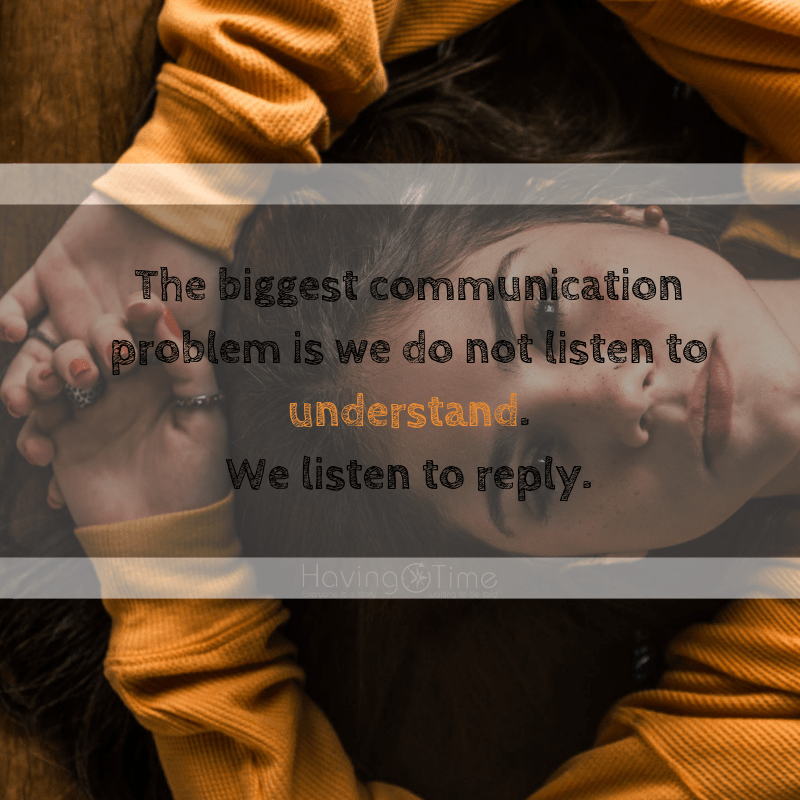What is the biggest problem that we are facing when it comes to communication? We would argue that the biggest communication problem is when we don’t listen to understand another person; instead, we listen to reply. And as communication continues to be one of the most important foundations of any healthy relationship, learning to do it in a supportive way is crucial for maintaining a partnership. If there is a communication breakdown, the challenges will continue, and your relationship could turn into a toxic mess. Learn which communication skills you can improve starting today.

Being able to communicate effectively is the most important of all life skills. Effective communication skills enable us to pass information to other people and understand what is said to us. Pay attention to a baby listening carefully to its mother trying to echo the sounds that she makes to realize how fundamental is the urge to communicate.
5 Communication Skills to Help You Build a Healthy Foundation for Any Relationship
1. Active Listening
When it comes to building strong communication skills, listening, really listening to someone is not as easy as you think.
Often, when we are listening, we are constructing the next thought we want to say. Then, we often insert our agenda without letting the other person finish talking. When this happens, there is a bit of a disconnect that prevents you from truly hearing or absorbing what is being said. It can leave the other person feeling invalidated or unseen.

If you can’t reflect the person what they just said, chances are you did not actually hear them. When someone feels heard and seen, it will mostly like deescalate any heated situation. This, of course, takes practice, but if it is something you can learn to master, you will dramatically help any relationship.
2. Begin With Empathy
Having empathy allows you to put yourself in the shoes of the other person. You may not fully understand their experience, but most likely, you will have some idea of what they are going through.
Rather than jumping in with a similar story that you have experienced, allow the other person to tell their story first. This one goes hand-in-hand with active listening by letting the other person speak without interruption or inserting your own thoughts and feelings.
When we instantly share our experience, at times, it can feel like we are trying to “one-up” someone. Generally, the intention is to say yes, I have been there, and this was my experience, which can be supportive at times. But make sure you are allowing space for the other person to express their situation and be validated without hearing your story.
3. Take a Time Out
When tensions run high, communication is often handled in less than ideal ways. If we are angry or frustrated, our ability to think logically shuts down. This is why it is so easy to say regrettable utterances in the heat of an argument or not be able to come up with the perfect rebuttal.
As with most anxiety-provoking situations, it is always helpful to slow down, take a breath, and give yourself a good ole fashioned time-out. Give meditation a go!
When we allow ourselves a moment to pause and regulate the nervous system, the thinking part of the brain is allowed to come back online once more. And although you still may feel angry, it may be possible to approach the argument with a little more rational thought or the ability to see the other’s point of view.
This tactic can be essential to avoid saying something incredibly hurtful or something that could get you fired. Take a break, and when you feel calm, reproach the situation even if that means sleeping on it.
4. Write It Down
When you are flooded with overwhelming feelings, it can be challenging to gather your thoughts. Taking time to write down what you are thinking, feeling, or what you want to let the other party know can support your own mental clarity and avoid damaging interactions.
This could like like a journaling brain dump, or even the traditional letter was written to the other person. The idea isn’t necessarily to give these musings to the other person, although that can certainly happen.
Journaling can help you get centered and focused on what is really going on for you. Sometimes it may not be appropriate to voice everything, and when you take time to re-read what was written, you may find that certain harsh feelings just needed to be vented but may not necessarily support the situation. When you feel ready, then healthily express your feelings, whether it be verbally or actually giving the letter to the person.
5. Fight Fair
A heated discussion is not necessarily a bad thing if it is done in a way that does cause hurt, anger, or more turbulent feelings. It’s ok to disagree and have differing opinions, but if you cannot healthily express this, this can add to more communication breakdowns and challenges.
Do not bring up old arguments or irrelevant disputes to prove a point. This only adds fuel to the fire and most likely has nothing to do with the current situation. Most of the time, the past should be left in the past. If a repeated event does surface, it is most likely time to address the repeated pattern.
When discussing these issues, don’t blame the other person or point the proverbial finger. This only puts the other person on the defensive, making their ability to think rationally leave the room.
Try using your “I” statements, which express how the other person’s action made you feel. This could like saying I felt hurt when you didn’t call me back, rather than saying, “you never call me back.” See the difference? If you can put the frustration on your own experience, rather than the other person’s, it will shift the dynamic into a much more positive one.
Also, please, make sure to look into the Non-Violent Communication framework to advance your communication skills further.
While this list is not comprehensive in all communication tactics, it will certainly give a fresh change in any relationship.
When we can step back and slow down in the process, communication can run smoothly in both directions, allowing both parties to be heard and understood.
The most important part to remember is you don’t have to agree with someone to have healthy communication. It’s ok to feel differently. Using these tools will reduce misunderstanding and add support to any relationship.
photo source | adobe


